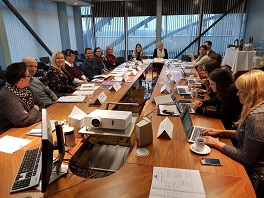There is no such thing as the perfect recipe for sound and long-lasting regional development, but the Regions of Gastronomy went pretty far in the process of building their own successful formulas to empower local communities. With creative and innovative proposals spicing the dish, during the 12th Regions of Gastronomy Platform meeting they renewed their commitment to cross-sectoral dialogue as one of the main ingredients to nurture sustainable local growth.
Held on 3-5 October 2017 in Riga-Gauja (Latvia), European Region of Gastronomy 2017 and hosted by Riga Tourism Development Bureau (LIVE RīGA), the meeting gathered representatives from IGCAT and Platform member regions to identify opportunities for strengthened cross-border collaboration. Eszter Tóth from the Faculty of Economics and Business of the University of Debrecen was also welcomed as an observer from Hungary.
With the aim of enhancing the Platform’s visibility, joint promotional tools were discussed, paying special attention to the development of a new website for the Regions of Gastronomy, with the support of Dr. Andris Klepers from Vidzeme University of Applied Sciences who held a workshop on Trends of gastronomy tourism: target groups & marketing; and producer and publisher of food content, Liene Vilnīte, who gave a presentation on Content creation in gastronomy marketing. A new promotional video showcasing innovative and creative experiences in the regions was also approved and is now available on IGCAT’s YouTube channel.
During the meeting, Platform members reiterated their commitment to sustainability by sharing good practises on the collection of useful monitoring indicators, and exchanged views on the possible legacy of the European Region of Gastronomy title. In light of the strong interest expressed by a number of regions to join the Platform, a revision of the European Region of Gastronomy guidelines was called for. Amendments concerned mainly the inclusion of a gastronomy plan as a strong recommendation in the process of bidding for the European Region of Gastronomy title, as well as the development of tools to foster increased communication between Platform members, especially in the organisation of major events.
Furthermore, regions reported about the successful initiatives that took place within their programmes, sharing good practises with the Platform, and accounted for possibilities of overcoming their current challenges.
The development of a governance model aimed to involve more closely local stakeholders in each region was also discussed. By boosting peer-to-peer communication across borders and within specific sectors such as tourism, education and agriculture to name a few, the Platform intends to promote increased knowledge-sharing and exciting joint projects among local partners to be developed under the umbrella of the Regions of Gastronomy programme and, especially, in the framework of the European Year of Cultural Heritage 2018.
President of IGCAT, Dr. Diane Dodd reported then about the increased interest and support that IGCAT and the European Region of Gastronomy programme raised among European institutions such as DG Education and Culture and the Committee of the Regions.
Finally, Platform members expressed their enthusiasm in view of momentous collaboration projects and events in their calendar. Among them, the official Award Ceremony of Kuopio, European Region of Gastronomy 2020, following the workshop on Food and gastronomy as innovation drivers for more resilient regions, both organised on 11 October 2017 at the Embassy of Finland in Brussels, in the framework of the European Week of Regions and Cities; and the eagerly awaited European Young Chef Award 2017, organised on 5-6 November 2017 in Catalonia.
During the meeting, Platform representatives had also the chance to meet Riga-Gauja’s local stakeholders and experience a touch of the region’s gastronomic and cultural traditions. A hands-on cooking experience took place at Restaurant Service School in Riga, while interesting case-studies of Riga-Gauja, European Region of Gastronomy 2017 official souvenirs were presented, during which regions’ representatives could witness outstanding examples of innovation and creativity combined with tradition and captivating storytelling. Among them, Rāmkalni, offering locally made food products; ZS “Doctus,” producing teas and infusions made with locally grown herbs; Joviality Academy, showcasing the process of barrels hand-making; Valmiermuizas Brewery, manufacturing local craft-beer; Birzī, producing burch sap syrup; and Zilvery Winery, proposing unusual wines made with local wild berries and flowers.
The European Region of Gastronomy Platform and Award aim to contribute to better quality of life in European regions, by highlighting distinctive food cultures, educating for better health and sustainability and stimulating gastronomic innovation. IGCAT (International Institute of Gastronomy, Culture, Arts and Tourism) organises the award with the support of European institutions.
IGCAT is a non-profit organisation established in 2012 working in the fields of gastronomy, culture, arts and tourism. Through its worldwide network of experts, IGCAT aims to empower local communities by guiding, facilitating, and supporting local leaders in cities, regions and cultural projects to understand the potential of their distinct food, culture, arts and sustainable tourism assets. IGCAT is the official secretariat for the Region of Gastronomy Platform and provides the European Region of Gastronomy Award, the European Young Chef Award and the Innovative Food Souvenir Award.

